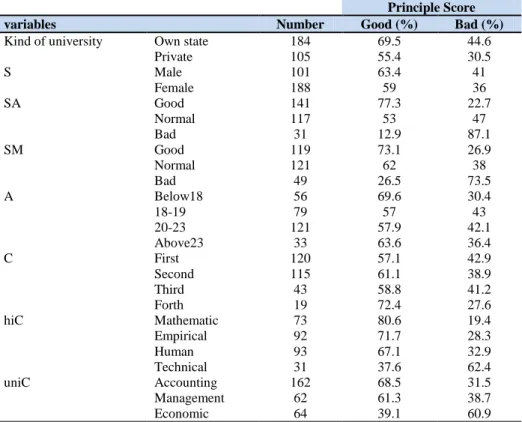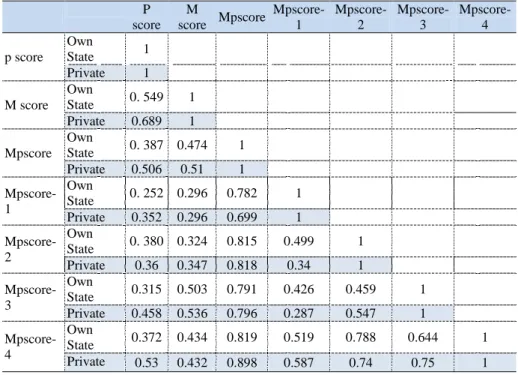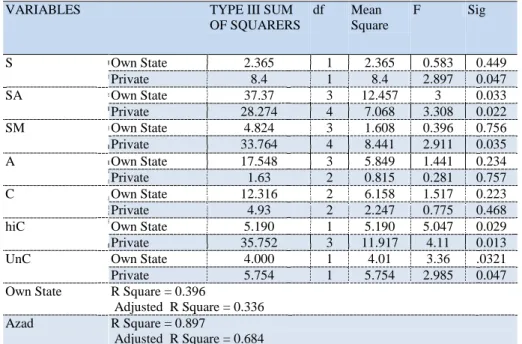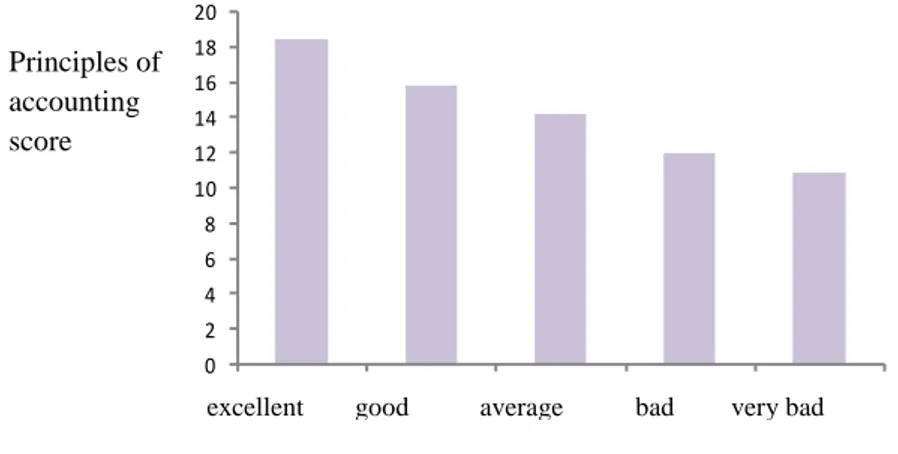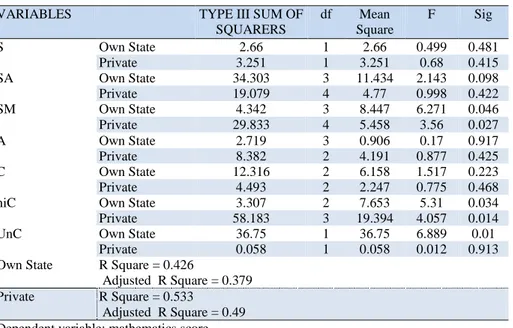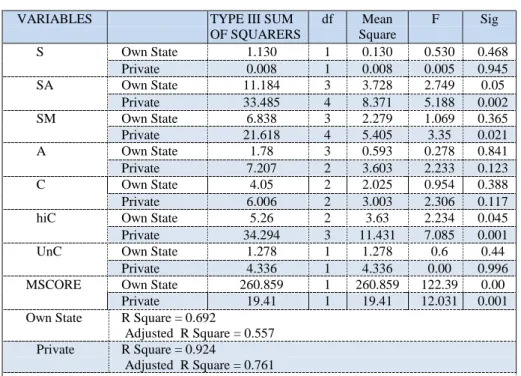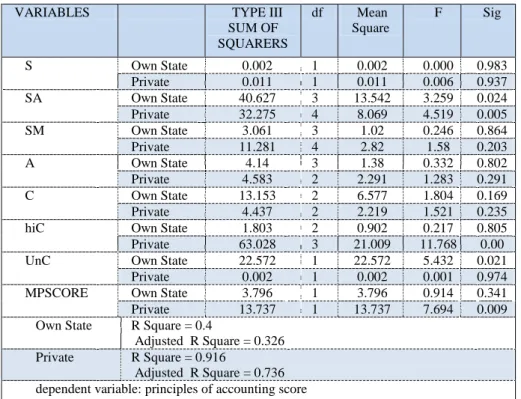The Effect of Mathematics Subject on Accounting
Students of Private and State Universities in Iran
Mahdi MORADI
Mahdi SALEHI
Somayeh KHALILIANMOVAHED
ABSTRACT. It is proved that mathematics ability effect on
understanding in principles of accounting in some research but number of these investigations is very low. The main purpose of this research is to explore the relationship between influence of mathematics ability on understanding in principles of accounting through investigating relationship between students score in principle of accounting lesson and students score on mathematics pre-test and math score. Statistical sample consists of 184 own state university’s students and 105 private university’s students that they had selected principle of accounting lesson, involved 120 accounting fields students, 84 management students and 85 economic students. Pre-test only involve areas of mathematics that have more impact on understanding in principles of accounting. Results showed students arithmetical skills are high in both universities and conceptual skills in own state university and algebra skills in private university are low and mathematics skills has a significant effect on principles of accounting score. In addition, students’ self-confidence beliefs and its impact on students score in mathematics and principles of accounting lessons were explored. Results showed students who had high level of self-confidence had gotten better scores.
Keywords: skills, principles of accounting, math pre-test,
self-confidence.
Associate Professor of Accounting, Ferdowsi University of Mashhad, Mashhad, Iran
Assistant Professor of Accounting, Ferdowsi University of Mashhad, Mashhad, Iran, E-mail: mahdi_salehi54@yahoo.com
INTRODUCTION
Mathematics knowledge has prepared suitable facilities such as presentation precise analysis, relationship description between phenomenon and decreasing prediction error in different science. Indeed, most of accounting variables are numerical then mathematical conceptions were expanded in accounting. One of the main goals of mathematics education is to increase understanding, analyzing, and expansion of scientific and creative thinking. Historically accounting has been based on mathematics knowledge. Loca Pachioly believed that with using of math view of point could present logic for debt and credit rules. By learning mathematics will get dynamic to principles of accounting studying, expand abilities, and create a critical analysis (Warsono, Darmawan, and Ridha, 2009).
Since accounting course in Iran country is accepted of four high school fields (mathematics, empirical science, human science and technical) therefore students abilities in mathematics would be different that might affect on their successful in principles of accounting then they should schedule for this matter to improve their abilities (Gary, 2008). Gender differences in mathematics achievement and differences in participation amount girls and boys in advanced mathematics courses were heard hence gender equality in mathematics achievement sound still unlikely. Self-confidence in mathematics achievement does not clear and seems be different in girls and boys. Thus, impact of self-confidence was explored in principles of accounting and mathematics lessons. Results showed students who had higher level of self-confidence got better scores.
Review of Related Literature
Accounting defines operational conceptions by use of numerical contexts (Yunker, Yunker, Krull, 2009). Mathematics abilities are investigated in order to create better understanding of accounting problems and financial statements analysis. It seems accountants who have higher level of mathematics abilities are more successful than others are. Students who have arithmetic and algebra skills would understand accounting better (Pritchard, Romeo, and Saccucci, 2000). Students who passed advanced mathematics course generally had better performance in accounting and elementary business courses (Alcock, Cockcroft, and Finn, 2008). Ballard and Johnson (2004) explored mathematics affects on economic course. Their goal was determination students' performance in math pre-test (As a predictor progressing in economic course). They described math pre-test can determine relationship between students performance in economic lesson
and various mathematics operations. Rainsbury and Darroch (2009) proved logic was applied in accounting double equation determine its elements. They described place of assets and costs with usage mathematics logic is explainable. Debt and credit rules are completely base on mathematics logic and they suggested that accounting learning should be performed by using a mathematics view point.
Empirical observations show that there is relationship between self confidence and progressing. Students who had high level of self confidence were earned higher scores in performing homework and examination that relate to writing.
Students with less self confidence believe that they are disabling. When students expected desirable results and positive valuation of themselves will improve their performance. Rainsbury and Darroch (2009) described students who self confidence about their mathematics abilities had got better score toward students who had no self confidence. But this matter did not prove in their research they suggested students mathematics abilities should be examined to determine weakness that is in their mathematics knowledge and necessary decisions for fulfilling this gap. Meelissen and Luyten (2008) showed gender differences are decreasing in mathematics learning. Participation rate of girls in advanced mathematics courses in several country shows gender equality still is unlikely. They concentrated over influential factors on sexual differences in mathematics achievement (self-confidence, the interest value of mathematics, the attainment value of mathematics and gender stereotyped views of mathematics). Results showed gender differences that relate to self-confidence in mathematics achievement are more important than other factors.
Research Methodology
Method is used in this research is empirical. After beginning semester a
math pre-test was given to students who had selected principles of accounting lesson. Examination questions involved special areas that correlated with accounting. Students were not allowed to use of calculator for responding. At the end of semester, each of student’s performance in math score and math pre-test score was compared with principles of accounting course.
Questionnaire consists of three parts as below:
The first section is related to demographic and situational information involves:
Sex (female = 1, male = 0)
Course ( accounting = 1, management = 2, economic = 3)
Age ( under 18 = 1 to over 23 = 4)
Since principles of accounting lesson is presented for management and economic fields, therefore impact of this factor is considered in this research. Second section includes questions that related to students course in high school and students self-confidence in mathematics and principles of accounting courses.
Third section composed of 24 math questions that responding time to this math pre-test is 25 minutes. 24 items was divided as below:
Table1. Descriptive Statistic
VARIABLES EXPLANATION STD. DEV MEAN N
S Sex Own State 0.476 0. 66 184
Private 0.486 0.63 105
SA Self confidence in accounting Own State 0. 826 2.58 184
Private 0.910 2.46 105
SM Self confidence in
mathematics
Own State 0. 890 2.66 184
Private 0.930 2.78 105
A Age Own State 0.466 2.08 184
Private 0.570 3.10 105
C Class Own State 0. 180 2.02 184
Private 0.738 2.89 105
hiC High school course Own State 0. 818 2.05 184
Private 0.974 2.69 105
UnC University course Own State 0. 810 2 184
Private 0.233 1.06 105
PSCORE Principles of accounting
score
Own State 3.413 14.96 184
Private 2.600 16.17 105
MSCORE Mathematics score Own State 3.265 14.889 184
Private 3.062 15.60 105
MPSCORE Math pre-test score Own State 4.308 0. 856 184
Private 0.184 0.480 105
MPSCORE-1 Math pre-test score1-
arithmetic
Own State 3.704 0. 925 184
Private 0.235 0.563 105
MPSCORE-2 Math pre-test score2-
percentages and proportions
Own State 1.858 0. 787 184
Private 0.239 0.477 105
MPSCORE-3 Math pre-test score3- algebra Own State 1.789 0. 853 184
Private 0.240 0.40 105
MPSCORE-4 Math pre-test score4-
conceptions
Own State 2.174 0.644 184
8 items involving principally arithmetic.
8 items involving principally percentages and proportions.
8 items involving principally algebra.
Arithmetical operations include addition, subtraction, multiplication and division.
Percentages and proportions operations on fractional numbers. Algebra includes algebraic solution for an unknown X. According another categorizing, questionnaire consists of:
9 items involving substantial conceptions.
15 items not involving substantial conceptions.
Substantial conceptions include 2 arithmetic items, 4 percentages and proportions items and 3 algebra items. The questionnaire was completed by 184 own state university's students and 105 Private university's students who had selected principles of accounting lesson that involved 9 class and was thought by 8 various teachers. A questionnaire administrated among the students and considered 25 minutes for responding. Students were not allowed to use of calculator.
Table 1 shows numbers of students who had selected principles of accounting course. In the current study, the questionnaire adopted from Yunker, Yunker and Krull (2009) questionnaire.
The mean math pre test score in Table1 indicates questions percentage answered correctly. The lowest of five score in own state university is MPSCORE4 (0.644) pertaining to conceptions but in private university is MPSCORE3 (0.40), while the highest score in own state university is MSCORE1 (0.925) pertaining to arithmetic items and in private university is also MSCORE 1 (0.563). Table 2 shows results of chi square test among demographic variables. According this table kind of university, students who have achieved above fifteen are considered good otherwise bad. Statistics show own state university (69.5%) generally has better than scores private university (55.4). females in comparing male have achieved better than scores (63.4%). Students who have the higher self-confidence in accounting and mathematics, they achieved the better scores. According to table students who their age is below 18 they achieved better scores. As results show students in forth class have the best scores (72.4) because they had more than skills in accounting and mathematics in comparing others. Students who their high school course were mathematics achieved the best scores (80.6) while, empirical, human and technical have achieved the lowest scores respectively. University course has a significant effect on principles of accounting score. Accounting course has the best scores (68.50) among other courses.
Table 3 shows correlation matrix among research important variables that contain principles of accounting score and mathematics abilities variables involve mathematics score and math pre-test 1 to pre-test 4. When two variables have closely, correlated coefficients indicate a warning sign that multicollinearity may affect on the results. When correlation between two variables is a lot distinguish of separation effects will be hard. Totally, when correlation coefficients between two variables be more than 0.5 indicate that multivariate might affect on results. The highest correlation in own state university is between MPSCORE and MPSCORE4 (0.819) so is in private university (0.898). The lowest correlation is between MPSCORE 1 and principles of accounting score (0.252) but in private university is between MPSCORE1 and MPSCORE3 (0.287).
Statistical method was applied in this study is general linear model (GLM). UNIANOVA for univariate analyses provides regression analysis and analysis of variance for one dependent variable by one or more factors
Table 2. Cross tabulation
Principle Score
variables Number Good (%) Bad (%)
Kind of university Own state 184 69.5 44.6
Private 105 55.4 30.5 S Male 101 63.4 41 Female 188 59 36 SA Good 141 77.3 22.7 Normal 117 53 47 Bad 31 12.9 87.1 SM Good 119 73.1 26.9 Normal 121 62 38 Bad 49 26.5 73.5 A Below18 56 69.6 30.4 18-19 79 57 43 20-23 121 57.9 42.1 Above23 33 63.6 36.4 C First 120 57.1 42.9 Second 115 61.1 38.9 Third 43 58.8 41.2 Forth 19 72.4 27.6 hiC Mathematic 73 80.6 19.4 Empirical 92 71.7 28.3 Human 93 67.1 32.9 Technical 31 37.6 62.4 uniC Accounting 162 68.5 31.5 Management 62 61.3 38.7 Economic 64 39.1 60.9
and/or variables. By this method is estimated incrementally explanatory power of variables: principles of accounting and mathematics ability. At the first relationship between PSCORE and MSCORE with demographic variables are explored. Second, affect of demographic variables and MSCORE was considered with PSCORE. At the end, incremental explanatory of PSCORE and MPSCORE was analyzed.
Most of correlation coefficient among the MSCORE variables is above 0.5 it is found should not be entered more than of one in equation regression. The lowest correlation coefficient in own state university is between MSCORE1 and PSCORE (0.252) but in private university is between MPSCORE1and MPSCORE3 (0.287).
Table 4 shows estimations of the incremental explanatory power of dependent variable, principles of accounting score and demographic variables that in own state university equals 0.336 and in private university equals 0.684 and shows general linear model's results of equation as below:
PScore = β1+ β2 G + β3 SA + β4 SM + β5 A + β6 Y + β7 hiC + β8 UnC
PScore = principles of accounting score
Table 3. Correlation matrix P score M score Mpscore Mpscore-1 Mpscore-2 Mpscore-3 Mpscore-4 p score Own State 1 Private 1 M score Own State 0. 549 1 Private 0.689 1 Mpscore Own State 0. 387 0.474 1 Private 0.506 0.51 1 Mpscore-1 Own State 0. 252 0.296 0.782 1 Private 0.352 0.296 0.699 1 Mpscore-2 Own State 0. 380 0.324 0.815 0.499 1 Private 0.36 0.347 0.818 0.34 1 Mpscore-3 Own State 0.315 0.503 0.791 0.426 0.459 1 Private 0.458 0.536 0.796 0.287 0.547 1 Mpscore-4 Own State 0.372 0.434 0.819 0.519 0.788 0.644 1 Private 0.53 0.432 0.898 0.587 0.74 0.75 1
G = sex (female = 1, male = 0) SA = self confidence in accounting SM = self confidence in mathematics A = age (under 18 = 1 to over 23 = 4) C = class
hiC = high school course UnC = university course
The R-squared statistic in own state university 0.336 indicates 33.6 percent of total variation in the dependent variable and in private university is 0.684; Pscore is statistically associated with variation in the demographic variables. By respect to p-value in Table 3 can be found which variables have significant affect on dependent variable.
Results in Table 4 show, shows in own state university self confidence in accounting(0.033), high school course (0.029), university course (0.0321) have significant affect on principles of accounting score and in private university sex(0.047), self confidence in accounting(0.022), self confidence in mathematics (0.035), high school course (0.013), have significant affect on principles of accounting score.
Table 4. Demographic variables affect on principles of accounting score
VARIABLES TYPE III SUM
OF SQUARERS df Mean Square F Sig S Own State 2.365 1 2.365 0.583 0.449 Private 8.4 1 8.4 2.897 0.047 SA Own State 37.37 3 12.457 3 0.033 Private 28.274 4 7.068 3.308 0.022 SM Own State 4.824 3 1.608 0.396 0.756 Private 33.764 4 8.441 2.911 0.035 A Own State 17.548 3 5.849 1.441 0.234 Private 1.63 2 0.815 0.281 0.757 C Own State 12.316 2 6.158 1.517 0.223 Private 4.93 2 2.247 0.775 0.468
hiC Own State 5.190 1 5.190 5.047 0.029
Private 35.752 3 11.917 4.11 0.013
UnC Own State 4.000 1 4.01 3.36 .0321
Private 5.754 1 5.754 2.985 0.047
Own State R Square = 0.396
Adjusted R Square = 0.336
Azad R Square = 0.897
Adjusted R Square = 0.684 dependent variable: principles of accounting score
As figure1 shows Mathematics course in high school has the highest score, and empirical, human, technical courses respectively have lower scores.
Figure 1. High school courses affect on principles of accounting score As figure 1 shows students, who was their high school mathematics achieved the highest score in principles of accounting. Because in this field students pass more mathematics units than others. In sequence as students pass lower mathematics units in high school, they give lower score in principles of accounting.
Figure 2. Self-confidence levels affect on principles of accounting score
0 2 4 6 8 10 12 14 16 18 20 0 2 4 6 8 10 12 14 16 18 20 Principles of accounting score Self-confidence levels
math empirical human technical
Principles of accounting score
excellent good average bad very bad
As figure 2 shows students who had the higher level of self-confidence got the better scores in principles of accounting lesson. As the level of self-confidence, decrease students give lower score.
Table5 shows in own state university estimation of incremental explanatory power of mathematics course and demographic variables that R-square equals 0.379 and in private university R-R-square equals 0.49 also shows general linear model's results equation as below:
MScore = β1+ β2 G + β3 SA + β4 SM + β5 A + β6 C + β7 hiC + β8 UnC
Mscore = mathematics score
According table5, in own state university self confidence in mathematics and high school course and in private university self confidence in mathematics, high school course and university course have a significant effect on math score then can be resulted when students have the higher level of self confidence, they will give the better score in mathematics, as well as students who their field in high school were mathematics achieved better results.
Table 5. Demographic variables affect on mathematics score
VARIABLES TYPE III SUM OF
SQUARERS df Mean Square F Sig S Own State 2.66 1 2.66 0.499 0.481 Private 3.251 1 3.251 0.68 0.415 SA Own State 34.303 3 11.434 2.143 0.098 Private 19.079 4 4.77 0.998 0.422 SM Own State 4.342 3 8.447 6.271 0.046 Private 29.833 4 5.458 3.56 0.027 A Own State 2.719 3 0.906 0.17 0.917 Private 8.382 2 4.191 0.877 0.425 C Own State 12.316 2 6.158 1.517 0.223 Private 4.493 2 2.247 0.775 0.468
hiC Own State 3.307 2 7.653 5.31 0.034
Private 58.183 3 19.394 4.057 0.014
UnC Own State 36.75 1 36.75 6.889 0.01
Private 0.058 1 0.058 0.012 0.913
Own State R Square = 0.426
Adjusted R Square = 0.379
Private R Square = 0.533
Adjusted R Square = 0.49 Dependent variable: mathematics score
Table 6 shows estimation of incremental explanatory power of principles of accounting course with demographic variables and math score in own state university equals 0.557 and in private university equals 0.761 also shows general linear model's results as below:
PScore =β1+β2 G +β3 SA +β4 SM + β5A +β6C +β7 hiC +β8 UnC + β9MScore
Results in Table 6 shows in own state university self-confidence in accounting, high school course and mathematics score and in private university self confidence in accounting, self confidence in mathematics, high school course and mathematics score have a significant effect on principles of accounting score. Based on statistical results are presented in Table 6 can be concluded mathematics abilities have affected on understanding in principles of accounting. Mathematics score also have a significant effect on principles of accounting score. Students who had the higher level of self-confidence got the better scores.
Table 6. Demographic variables and mathematics score affect on principles of
accounting score
VARIABLES TYPE III SUM
OF SQUARERS df Mean Square F Sig S Own State 1.130 1 0.130 0.530 0.468 Private 0.008 1 0.008 0.005 0.945 SA Own State 11.184 3 3.728 2.749 0.05 Private 33.485 4 8.371 5.188 0.002 SM Own State 6.838 3 2.279 1.069 0.365 Private 21.618 4 5.405 3.35 0.021 A Own State 1.78 3 0.593 0.278 0.841 Private 7.207 2 3.603 2.233 0.123 C Own State 4.05 2 2.025 0.954 0.388 Private 6.006 2 3.003 2.306 0.117
hiC Own State 5.26 2 3.63 2.234 0.045
Private 34.294 3 11.431 7.085 0.001
UnC Own State 1.278 1 1.278 0.6 0.44
Private 4.336 1 4.336 0.00 0.996
MSCORE Own State 260.859 1 260.859 122.39 0.00
Private 19.41 1 19.41 12.031 0.001
Own State R Square = 0.692
Adjusted R Square = 0.557
Private R Square = 0.924
Adjusted R Square = 0.761 dependent variable: principles of accounting score
Table 7 shows in own state university estimation of incremental explanatory power of principles of accounting course and math pre-test that R square equals 0.326 and in private university R square equals 0.736, also shows general linear model's results as below:
PScore = β1+ β2 G+ β3 SA +β4 SM + β5 A + β6 C + β7 hiC + β8 UnC + β9MP
MPScore= math pre-test score
Results in Table 7 shows math pre-test score does not has significant affect on Principles of accounting score in own state university while self confidence in accounting and university course have significant affect on Principles of accounting. In private university math pre-test score, self-confidence in accounting, high school course have a significant effect on principles of accounting score.
Table 7. Demographic variables and mathematics score affect on
principles of accounting score
VARIABLES TYPE III
SUM OF SQUARERS df Mean Square F Sig S Own State 0.002 1 0.002 0.000 0.983 Private 0.011 1 0.011 0.006 0.937 SA Own State 40.627 3 13.542 3.259 0.024 Private 32.275 4 8.069 4.519 0.005 SM Own State 3.061 3 1.02 0.246 0.864 Private 11.281 4 2.82 1.58 0.203 A Own State 4.14 3 1.38 0.332 0.802 Private 4.583 2 2.291 1.283 0.291 C Own State 13.153 2 6.577 1.804 0.169 Private 4.437 2 2.219 1.521 0.235
hiC Own State 1.803 2 0.902 0.217 0.805
Private 63.028 3 21.009 11.768 0.00
UnC Own State 22.572 1 22.572 5.432 0.021
Private 0.002 1 0.002 0.001 0.974
MPSCORE Own State 3.796 1 3.796 0.914 0.341
Private 13.737 1 13.737 7.694 0.009
Own State R Square = 0.4
Adjusted R Square = 0.326
Private R Square = 0.916
Adjusted R Square = 0.736 dependent variable: principles of accounting score
CONCLUSION AND SUGGESTIONS
The main purpose of this research is exploration of math abilities that affect on understanding in principles of accounting via exploring mathematics score and math pre-test score that includes various areas of mathematics (arithmetic, percentages and proportions, algebra operations and conceptions) on students’ performance in principles of accounting course. Arithmetic, percentages and proportions, algebra operations and conceptions are composed of eight questions and conception consists of nine questions. Results shows students have highest skill in arithmetic (own state 92.5%, private 56.3%) and own state university's student got the lowest score in conceptions that consist of 2 arithmetic questions, 4 percentages and proportions questions, 3 algebra questions that indicate students have highest weakness in this matter (64%) but in private's student had the lowest score in algebra (40%).
In addition, research's results showed mathematics skills affect on understanding in principles of accounting course as a key factor of successful in accounting course. Another factor that would affect on understanding in principles of accounting are considered gender, age, high school course, university course and self confidence. In order to fulfill this goal a questionnaire was given to students that is consist of 3 part and contain demographic information, high school course and self confidence, math pre-test. For responding to this questionnaire was considered 25 minutes time and students were not allowed to use of calculator. Statistical sample consist of 184 own state university's students and 105 private university's students who had selected principles of accounting lesson.
First, affects of demographic variables on principles of accounting course and mathematics score was explored, in order to achieve this goal was applied general linear model to explore affect of independent variables on accounting course in own state and private university. Self confidence in accounting, high school course and university course and mathematics score had a significant effect on understanding in principles of accounting in own state university and self confidence in accounting, high school course, self confidence in mathematics, mathematics score and math pre-test score had a significant effect on understanding in principles of accounting in private university. For exploring relationship among demographic variables were applied chi square test, results showed student who had a high level of self confidence achieved better score, and students who was their high school course mathematics got the highest score and the lowest scores were empirical, human and technical courses respectively. In generally, female had better scores and accounting course achieved the best results and
students who were in the higher class their scores better than others because of more skills in accounting and mathematics. According to this research mathematics score has a significant effect on principles of accounting score, math pre-test score also has a significant effect on principles of accounting score in private university.
Based on results of this research in order to increase quality level of accounting education some suggestions are presented as below:
1) Mathematics abilities should be considered and attempted for promoting it.
2) Passing more mathematics units in first semester specially for students who have less ability in mathematics with considering their high school course.
3) Quality level increasing in accounting and mathematics education in order to promote students self-confidence.
4) performing investigation for exploring affect of English language learning on understanding in principles of accounting.
REFERENCES
Alcock, J. Cockcroft, S. and Finn, F. (2008). Quantifying the advantage of secondary school mathematics study for accounting and finance undergraduates, Accounting and Finance, 481, 697-718.
Ballard, C L., Johnson, MF (2004). Basic Math Skills and Performance in an Introductory Economics Class, Journal of Economic Education 35(1): 3-23. Gary, N. (2008). Marks Accounting for the gender gaps in student performance in
reading and mathematics: evidence from 31 countries Oxford Review of Education, Vol. 34, No. 1, pp. 89–109.
Meelissen, M., Luyten, H., (2008). The Dutch gender gap in mathematics: small for achievement, substantial for beliefs and attitude Studies in Educational, 34, pp. 82-93.
Pritchard, R E., Romeo, GC, Saccucci, MS. (2000). Quantitative skill and Performance in Principles of Finance: Evidence from a Regional University, Financial Practice and Education 10 (2): 167-174.
Rainsbury, E., Darroch, A. (2009). Accounting and Finance Association of Australia and New Zealand Conference, 5 -7.
Warsono, S., Darmawan, A., Arsyadi Ridha, M. (2009). Using Mathematics To Teach Accounting Principles. Accounting Principles, Volume 1 Chapters 1-13, Second Edition.
Yunker, P J., Yunker, JA., Krull, GW. (2009). The influence of mathematics ability on performance in principles of accounting. The Accounting Educations Journal Volume Xix pp.1-20.
